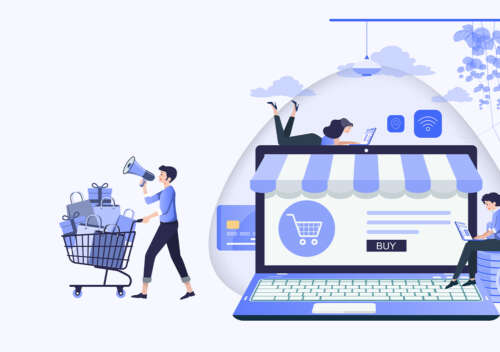Which eCommerce Platform is Best for Small Business?
An eCommerce development company helps businesses choose the right platform to establish a strong online presence. With the rising demand for affordable and feature-rich eCommerce development services, selecting the best platform can be overwhelming. However, an experienced eCommerce development company provides expert guidance, ensuring businesses choose a platform that aligns with their needs, budget, and scalability goals.
Not only is selecting the right platform challenging, but finding a reliable eCommerce development company is equally crucial. The right guidance can make a significant difference in making a financially sound decision. To assist you in this process, this article provides an in-depth analysis of the best eCommerce platforms for small businesses in 2024.
These solutions offer essential features to help you launch your site quickly, drive traffic, and boost sales. By exploring various eCommerce development options, this guide will help you choose the right platform tailored to your business needs.
Let’s get started!
Best eCommerce platforms at a glance
Shopify
- Price: $29 per month for Shopify Basic
- Free trial length: 3 days
- Integrated sales channels: Online store, in-person, social media, email, marketplace, online search, B2B
- Mobile app: Yes
Shopify is the top e-commerce platform for small businesses. This comprehensive website builder provides tools to sell online, in person, on social media, and in marketplaces. With Shopify, you can design your store using over 100 professionally designed themes. This requires no hard-core coding skills.
Shopify POS allows businesses to process in-person sales. Shopify merchants also benefit from competitive shipping rates.
For web hosting, Shopify offers unlimited bandwidth and online storage, ensuring that hosting costs remain stable as the business grows.
Shopify includes email marketing features, abandoned cart recovery, and search engine optimization tools. You can manage your business from your phone using Shopify’s mobile app, allowing you to fulfil orders, add products, view real-time sales, and more.
WooCommerce
Cost: Free (excluding essential e-commerce features such as hosting, domain registration, SSL, shipping services, and payment processing).
Free Trial: Not applicable.
Integrated Sales Channels: Online store, in-person, online search, marketplaces, social media.
Mobile App: Yes, with limited functionality.
Native POS: Yes.
WooCommerce, an e-commerce platform by WordPress, originally designed for blogging websites, has evolved into a comprehensive website builder for small businesses. It offers the option to integrate WooCommerce for online sales capabilities.
Being open source, WooCommerce is highly customizable for those with the technical skills to design and code websites. Similar to Shopify, WooCommerce offers third-party integrations to enhance its functionality. While the WooCommerce plugin itself is free, additional integrations may require payment as your small business expands.
With the Shopify Buy Button, you can monetize your WordPress blog without migrating to a new platform. Embed the button, products, and checkout on any website to streamline the purchasing process for your customers.
Squarespace
Price: $28 per month for the Commerce Basic plan.
Free Trial Length: 14 days, with a one-time extension.
Integrated Sales Channels: Online store, in-person, social media, marketplaces.
Mobile App: Yes.
Native POS: Yes, through the mobile app.
Squarespace presents itself as another viable option for small businesses, boasting a user-friendly interface. With Squarespace, setting up an online store is made easy through its templates, drag-and-drop tools, and dependable functionality.
Initially launched as a website builder, Squarespace has expanded its features to cater to e-commerce needs. While many Squarespace users focus on selling services, the platform is also suitable for product-based businesses.
Squarespace offers a range of features, including scheduling and calendar integrations, email marketing tools, social media integrations, and embeddable maps to help customers locate your physical store. Additionally, Squarespace provides recurring billing options for subscription-based businesses.
Wix
Price: $29 per month for the Core plan, offering limited e-commerce features.
Free Trial: No free trial.
Integrated Sales Channels: Online store, in-person, social media, marketplaces, branded app.
Mobile App: Yes, with limited functionality.
Native POS: Yes.
Wix offers a comprehensive small-business website builder with specialized ecommerce features. Their paid plans provide a range of ecommerce capabilities, such as order tracking, online payments, multichannel selling, and abandoned cart campaigns. To monitor your ecommerce performance effectively, access to analytics tracking requires a paid plan.
With over 500 templates available, designing your storefront on Wix is highly customizable. The drag-and-drop interface makes it easy to tailor the look and feel of your online store to suit your brand. Wix also supports subscription-based billing and dropshipping through third-party integrations.
Square Online
Price: Free with limited e-commerce features.
Free Trial Length: Not applicable.
Integrated Sales Channels: Online store, in-person, online search, social media.
Mobile App: Yes.
Native POS: Yes.
Originally launched as a point-of-sale (POS) device for retailers, Square has evolved into a comprehensive business management platform. Among its offerings is Square Online, an online storefront solution with templates designed specifically for small businesses, including retailers and restaurants.
Square Online includes built-in payment processing with competitive transaction fees, making it a convenient and cost-effective option for businesses looking to establish an online presence.
BigCommerce
Price: $29 per month for the Standard plan.
Free Trial Length: 15 days.
Integrated Sales Channels: Online store, in-person, social media, marketplaces, comparison shopping engines.
Mobile App: Yes, with some features exclusive to Android.
Native POS: No.
Weebly
Price: Free with limited e-commerce features.
Free Trial Length: Not applicable.
Integrated Sales Channels: Online store.
Mobile App: Yes.
Native POS: No.
Weebly, powered and operated by Square, seamlessly integrates with other Square-owned tools, providing a comprehensive solution for businesses. This integration includes a secure online shopping cart and inventory management system.
Weebly’s e-commerce platform offers small businesses a range of features, including a filterable product search tool, optimized mobile checkout process, efficient order management and processing, and flexible shipping options. While Weebly offers basic features, its user-friendly interface makes it easy for businesses to get started.
How to Choose the Right eCommerce Platform?
When choosing the right platform, hiring an eCommerce development company can help ensure you get the best solution for your business needs. Consider the following suggestions when making your decision.
The cost of services
The budget you decide for the eCommerce development services is a crucial factor. This will determine the service provider you will hire. Therefore, set your budget initially in order to avoid any hassle later. Do consider upfront and ongoing cost, additional service cost, transaction fee and many other development costs.
Platform scalability
An eCommerce development company can help you select a platform that scales with your business growth. Therefore, it’s essential to choose a platform that ensures scalability as needed. Many platforms offer the required flexibility, so conducting thorough research before finalizing the right one for your venture is crucial.
Customisation options
An experienced eCommerce development company can help you customize your online store to align with your brand identity. An eCommerce platform that is easily customizable will offer custom layouts, storefront options, and the ability to add or remove on-page elements as needed.
Mobile responsiveness
As the number of mobile shoppers is increasing, there is a greater audience that shop from mobile. This makes it crucial to include mobile responsiveness in the eCommerce platform that you would like to create. There are various mobile responsive themes that one can choose.
In Conclusion
In conclusion, the best e-commerce platform for your small business depends on your specific needs and goals.
Shopify is a robust and versatile option with a wide range of features, while WooCommerce offers flexibility and customization for those familiar with WordPress. Squarespace provides a user-friendly interface for creating a stylish online store, and Wix offers a comprehensive website builder with integrated e-commerce features.
Weebly, powered by Square, is a simple yet effective option for businesses looking to get started quickly. Ultimately, the best platform is one that aligns with your business objectives, budget, and technical expertise. The right eCommerce development company will help you to evaluate your options carefully before making a decision.



